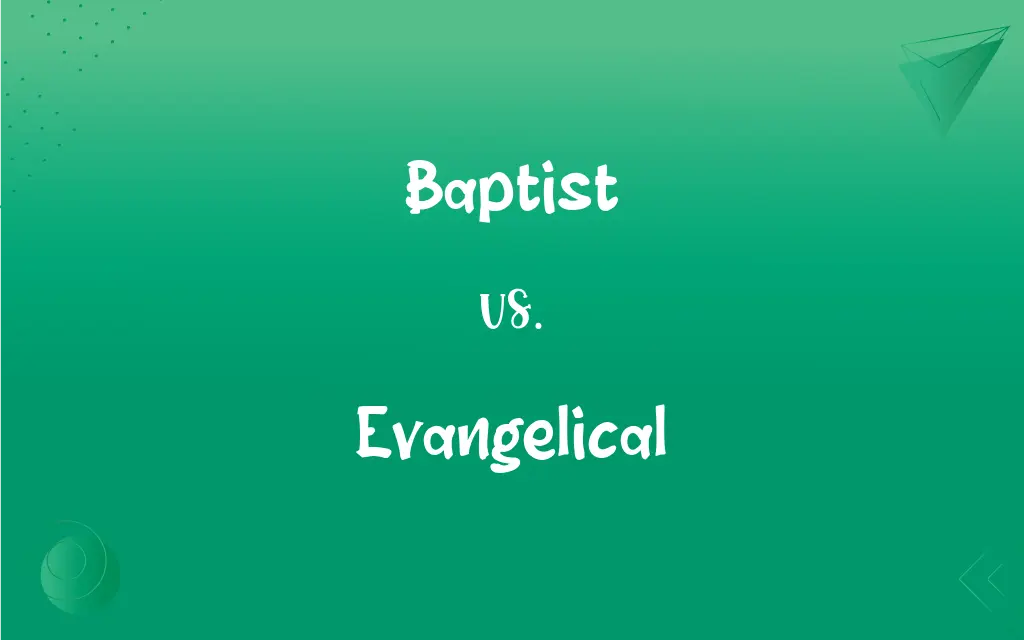Baptist vs. Evangelical: What's the Difference?
Edited by Aimie Carlson || By Harlon Moss || Published on February 9, 2024
Baptists are a Christian denomination emphasizing baptism for believers only, while Evangelicals are a broader group focusing on the authority of Scripture and the need for personal conversion.

Key Differences
Baptists are known for their practice of believer’s baptism, typically by immersion, signifying a personal decision to follow Christ. Evangelicals, while also often practicing baptism, emphasize a personal relationship with Jesus and being "born again," regardless of baptism method. Both groups value the importance of a personal faith commitment, but Baptists place specific emphasis on the act of baptism.
In terms of church governance, Baptists traditionally uphold local church autonomy, meaning each congregation governs itself. Evangelicals, however, can be part of various denominations with different governance structures. While both Baptist and Evangelical churches value congregational involvement, the degree of autonomy and structure can vary significantly.
The Baptist tradition strongly emphasizes the authority of the Bible in matters of faith and practice. Similarly, Evangelicals also hold Scripture in high regard, often focusing on a literal interpretation. Both groups prioritize biblical teachings but may differ in their approaches to interpretation and application.
Baptists are known for their strong commitment to religious freedom and separation of church and state. Evangelicals, while also often supporting these principles, are more broadly focused on societal engagement and may be more involved in political activism. Both value religious expression but differ in their approaches to engaging with secular society.
Worship styles in Baptist churches tend to be more traditional, although contemporary forms exist. Evangelical churches, however, often embrace contemporary worship styles and are generally known for their dynamic and emotive worship services. Despite these differences, both traditions seek to create environments that foster a personal and communal connection with God.
ADVERTISEMENT
Comparison Chart
Baptism Practice
Believer’s baptism by immersion
Various baptism practices; focus on being born again
Church Governance
Local church autonomy
Various denominations with different structures
Biblical Authority
Strong emphasis on Bible as faith's authority
High regard for Scripture, often literal interpretation
Societal Engagement
Focus on religious freedom, separation of church and state
Broader societal engagement, including political activism
Worship Style
Traditionally more conservative, varies widely
Often contemporary and emotive
ADVERTISEMENT
Baptist and Evangelical Definitions
Baptist
Baptist churches are known for their stance on the autonomy of local congregations.
Their Baptist church independently organized a community outreach program.
Evangelical
They often hold to a literal interpretation of the Bible.
In his Evangelical church, the Bible was taught as the literal word of God.
Baptist
Baptists historically advocate for religious freedom and separation of church and state.
He, as a Baptist, strongly supported the principle of religious liberty.
Evangelical
An Evangelical is a Christian emphasizing personal conversion and the authority of the Bible.
The Evangelical preacher focused on the importance of a personal relationship with Jesus.
Baptist
A Baptist is a member of a Christian denomination advocating for believer’s baptism.
As a Baptist, she participated in the baptism ceremony after professing her faith.
Evangelical
Evangelicals are known for their emphasis on being ‘born again.’
As an Evangelical, she shared her born-again experience with others.
Baptist
Baptists typically practice baptism by immersion.
The Baptist church held a baptism service in the river.
Evangelical
Evangelicals are characterized by active engagement in evangelism and societal issues.
The Evangelical community organized a charity event to help the needy.
Baptist
They emphasize the authority of the Bible in their beliefs and practices.
Baptist teachings are deeply rooted in Scripture.
Evangelical
Worship in many Evangelical churches tends to be contemporary and emotive.
The Evangelical service was filled with contemporary music and passionate preaching.
Baptist
A member of an evangelical Protestant church of congregational polity, following the Reformed tradition in worship and believing in freedom of conscience, separation of church and state, and baptism only of voluntary, conscious believers.
Evangelical
Of, relating to, or in accordance with the Christian gospel, especially one of the four gospel books of the New Testament.
Baptist
Baptist One that baptizes.
Baptist
A person who baptizes.
Baptist
One who administers baptism; - specifically applied to John, the forerunner of Christ.
Baptist
One of a denomination of Christians who deny the validity of infant baptism and of sprinkling, and maintain that baptism should be administered to believers alone, and should be by immersion. See Anabaptist.
Baptist
Follower of Baptistic doctrines
Baptist
Of or pertaining to or characteristic of the Baptist church;
Baptist baptismal practices
A Baptist minister
FAQs
What is the main belief of Baptists?
Baptists primarily believe in believer’s baptism by immersion and the authority of the Bible.
Are all Evangelicals Baptists?
No, Evangelicalism spans various denominations, not limited to Baptists.
How do Baptists view the Bible?
Baptists view the Bible as the ultimate authority in matters of faith and practice.
Can Baptists be politically active?
Yes, while they advocate for separation of church and state, Baptists can be politically active.
What is the Baptist stance on religious freedom?
Baptists strongly advocate for religious freedom and the separation of church and state.
How do Evangelicals view evangelism?
Evangelism is a central aspect of the Evangelical faith, emphasizing spreading the Christian message.
Do Baptists believe in infant baptism?
No, Baptists practice believer’s baptism, not infant baptism.
Do Baptists have a central governing body?
No, Baptist churches typically operate autonomously without a central governing body.
What is the worship style in Evangelical churches?
Many Evangelical churches feature contemporary and emotive worship styles.
Are Evangelicals involved in social issues?
Yes, Evangelicals often engage in societal and political issues as part of their faith practice.
What worship style is typical in Baptist churches?
Worship styles in Baptist churches vary but often lean towards traditional or conservative.
What defines an Evangelical?
Evangelicals are defined by their emphasis on personal conversion, the authority of the Bible, and being ‘born again.’
What is the Evangelical approach to the Bible?
Evangelicals typically hold to a literal interpretation of the Bible.
Do Baptists emphasize missions and outreach?
Yes, missions and outreach are important aspects of Baptist practice.
How do Evangelicals prioritize missions?
Missions and evangelism are central to Evangelical practice.
Are Evangelicals ecumenical in their approach to other faiths?
Evangelicals often engage with other Christian denominations but typically uphold distinct doctrinal beliefs.
Do Evangelicals have a specific church structure?
Evangelicalism includes a range of church structures, as it is not limited to a single denomination.
Are Baptists part of a larger denomination?
Baptists can be part of various Baptist denominations, each with its own doctrines and practices.
Do Evangelicals have a specific doctrinal statement?
While there is no single doctrinal statement, common Evangelical beliefs include the need for personal conversion and the authority of Scripture.
How do Baptists view other Christian denominations?
Baptists generally respect other Christian denominations while holding to their distinct beliefs.
About Author
Written by
Harlon MossHarlon is a seasoned quality moderator and accomplished content writer for Difference Wiki. An alumnus of the prestigious University of California, he earned his degree in Computer Science. Leveraging his academic background, Harlon brings a meticulous and informed perspective to his work, ensuring content accuracy and excellence.
Edited by
Aimie CarlsonAimie Carlson, holding a master's degree in English literature, is a fervent English language enthusiast. She lends her writing talents to Difference Wiki, a prominent website that specializes in comparisons, offering readers insightful analyses that both captivate and inform.







































































